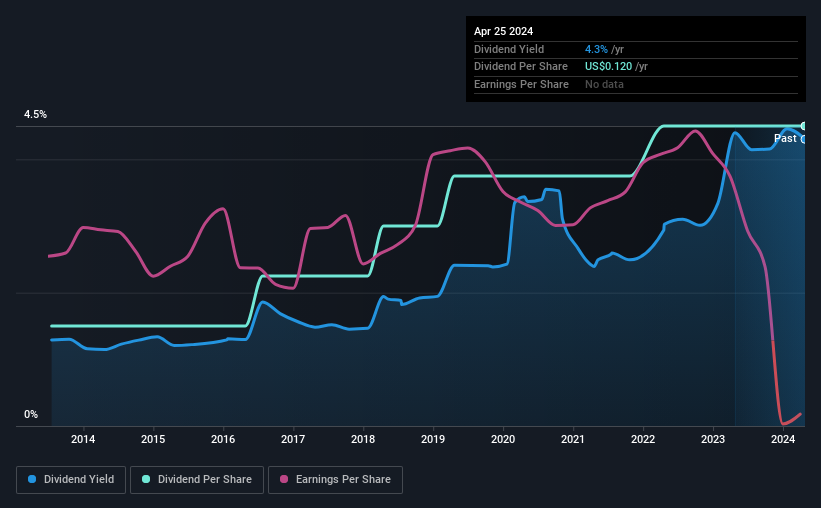AmeriServ Financial (NASDAQ:ASRV) Will Pay A Dividend Of $0.03
AmeriServ Financial, Inc.'s (NASDAQ:ASRV) investors are due to receive a payment of $0.03 per share on 20th of May. Based on this payment, the dividend yield on the company's stock will be 4.3%, which is an attractive boost to shareholder returns.
View our latest analysis for AmeriServ Financial
AmeriServ Financial's Distributions May Be Difficult To Sustain
While it is great to have a strong dividend yield, we should also consider whether the payment is sustainable.
AmeriServ Financial has established itself as a dividend paying company with over 10 years history of distributing earnings to shareholders. Despite this history however, the company's latest earnings report actually shows that it didn't have enough earnings to cover its dividends. This is very worrying for shareholders, as this shows that AmeriServ Financial will not be able to sustain its dividend at its current rate.
Looking forward, earnings per share could 17.9% over the next year if the trend of the last few years can't be broken. This means the company will be unprofitable and managers could face the tough choice between continuing to pay the dividend or taking pressure off the balance sheet.
AmeriServ Financial Has A Solid Track Record
The company has an extended history of paying stable dividends. The dividend has gone from an annual total of $0.04 in 2014 to the most recent total annual payment of $0.12. This works out to be a compound annual growth rate (CAGR) of approximately 12% a year over that time. So, dividends have been growing pretty quickly, and even more impressively, they haven't experienced any notable falls during this period.
Dividend Growth Potential Is Shaky
Investors could be attracted to the stock based on the quality of its payment history. However, things aren't all that rosy. Earnings per share has been sinking by 18% over the last five years. This steep decline can indicate that the business is going through a tough time, which could constrain its ability to pay a larger dividend each year in the future.
The Dividend Could Prove To Be Unreliable
Overall, it's nice to see a consistent dividend payment, but we think that longer term, the current level of payment might be unsustainable. We can't deny that the payments have been very stable, but we are a little bit worried about the very high payout ratio. Overall, we don't think this company has the makings of a good income stock.
Market movements attest to how highly valued a consistent dividend policy is compared to one which is more unpredictable. At the same time, there are other factors our readers should be conscious of before pouring capital into a stock. Just as an example, we've come across 3 warning signs for AmeriServ Financial you should be aware of, and 1 of them is a bit unpleasant. If you are a dividend investor, you might also want to look at our curated list of high yield dividend stocks.
Have feedback on this article? Concerned about the content? Get in touch with us directly. Alternatively, email editorial-team (at) simplywallst.com.
This article by Simply Wall St is general in nature. We provide commentary based on historical data and analyst forecasts only using an unbiased methodology and our articles are not intended to be financial advice. It does not constitute a recommendation to buy or sell any stock, and does not take account of your objectives, or your financial situation. We aim to bring you long-term focused analysis driven by fundamental data. Note that our analysis may not factor in the latest price-sensitive company announcements or qualitative material. Simply Wall St has no position in any stocks mentioned.

 Yahoo Finance
Yahoo Finance 
